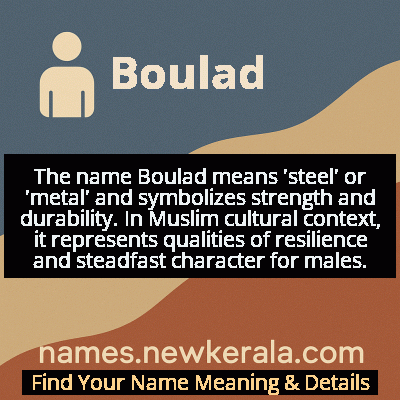Boulad Name Meaning & Details
Origin, Popularity, Numerology Analysis & Name Meaning of Boulad
Discover the origin, meaning, and cultural significance of the name BOULAD. Delve into its historical roots and explore the lasting impact it has had on communities and traditions.
Name
Boulad
Gender
Male
Origin
Muslim
Lucky Number
1
Meaning of the Name - Boulad
The name Boulad means 'steel' or 'metal' and symbolizes strength and durability. In Muslim cultural context, it represents qualities of resilience and steadfast character for males.
Boulad - Complete Numerology Analysis
Your Numerology Number
Based on Pythagorean Numerology System
Ruling Planet
Sun
Positive Nature
Leaders, ambitious, highly driven, self-reliant, innovative.
Negative Traits
Overly aggressive, domineering, impatient, selfish.
Lucky Colours
Red, orange, gold.
Lucky Days
Sunday.
Lucky Stones
Ruby, garnet.
Harmony Numbers
2, 3, 9.
Best Suited Professions
Entrepreneurs, managers, engineers.
What People Like About You
Courage, determination, leadership.
Famous People Named Boulad
Boulad al-Sayyid
Religious Scholar
Prominent Islamic scholar known for his commentaries on classical texts and educational reforms
Boulad al-Husseini
Military Commander
Noted for his leadership in regional conflicts and known for his strategic military innovations
Boulad Ahmed
Business Leader
Successful entrepreneur in the Middle East known for establishing major industrial enterprises
Boulad al-Mansouri
Poet
Renowned for his poetic works exploring themes of identity and cultural heritage
Name Variations & International Equivalents
Click on blue names to explore their detailed meanings. Gray names with will be available soon.
Cultural & Historical Significance
In many Muslim cultures, the name Boulad appears in historical records dating back several centuries, often associated with military leaders, craftsmen, and community protectors. The name's metallic connotation connects it to both practical craftsmanship and metaphorical strength, making it a popular choice among families valuing tradition and resilience. Its usage spans across various regions including the Middle East, North Africa, and parts of South Asia, where it maintains its cultural resonance while adapting to local linguistic variations. The name represents a continuity of cultural values that prioritize strength, reliability, and enduring character across generations.
Extended Personality Analysis
Individuals named Boulad are typically perceived as possessing strong, resilient personalities with a natural inclination toward leadership and protection. They often demonstrate remarkable perseverance in facing challenges, much like the steel their name represents. These individuals tend to be practical, grounded, and reliable, with a strong sense of duty and responsibility toward their families and communities. Their steadfast nature makes them dependable friends and colleagues who can be counted on during difficult times.
Boulads often exhibit a combination of traditional values and modern adaptability, balancing respect for heritage with contemporary thinking. They are frequently described as having strong moral compasses and clear principles, which they defend with conviction. While they may appear reserved initially, they typically possess deep emotional strength and loyalty to those they care about. Their metallic namesake reflects not just physical strength but also the ability to withstand pressure and maintain integrity through life's various challenges, making them natural pillars in their social and professional circles. This combination of traditional strength and modern resilience makes Boulads particularly effective in roles requiring both steadfastness and adaptability.
Modern Usage & Popularity
In contemporary times, Boulad remains a respected though relatively uncommon name in Muslim communities worldwide. Its usage has seen a modest resurgence among families seeking traditional names with strong, meaningful connotations. While not among the most popular names, it maintains a steady presence particularly in regions with strong cultural connections to craftsmanship and metalworking traditions. The name appeals to parents who value names with historical depth and symbolic strength, often chosen by those wishing to honor family heritage or cultural traditions while providing their sons with a name that embodies resilience and durability in the modern world. Its usage patterns show concentration in traditional Muslim communities while being rare in Western countries, maintaining its cultural specificity and symbolic power across generations.
Symbolic & Spiritual Meanings
Symbolically, Boulad represents much more than just the physical properties of steel or metal. It embodies the concept of inner strength, resilience, and the ability to withstand life's challenges without breaking. The name carries connotations of protection and reliability, suggesting someone who can serve as a foundation for others. Like well-tempered steel, a person named Boulad is expected to combine strength with flexibility - able to adapt to circumstances while maintaining core integrity. The symbolic meaning extends to concepts of endurance through difficulty, unwavering principles, and the capacity to be shaped by experience while retaining essential character, making it a powerful metaphorical representation of human strength and perseverance. This symbolism connects the individual to broader cultural values of durability, trustworthiness, and the ability to provide stability in changing circumstances.

